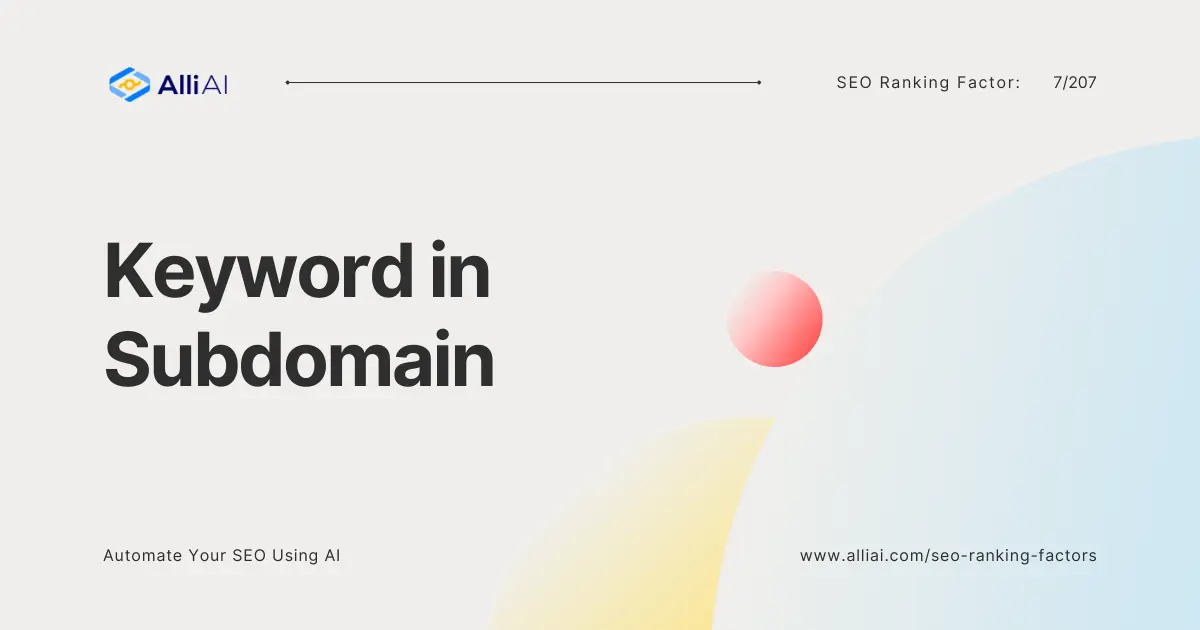What is Keyword Appears in Top Level Domain?
When we talk about a keyword appearing in the top-level domain, we’re referring to the exact match of a search query being part of the domain name itself. For example, if you’re searching for “vintage cars,” a website with the domain name “vintagecars.com” would be a classic illustration of this ranking factor in action.
To draw a real-life analogy, imagine walking down a street lined with shops. Each shop has a sign indicating what it sells. You’re more likely to enter a shop with a sign that exactly matches what you’re looking for, say “Vintage Cars,” rather than one with a vague or unrelated sign. Similarly, search engines tend to consider domains with specific keywords as more relevant to certain searches, potentially improving their visibility in search results.
Why is Keyword Appears in Top Level Domain important in SEO?
The importance of having your keyword appear in the top-level domain stems from the concept of relevance and user expectation. Search engines are in the business of providing users with the most relevant results for their queries. A domain name that matches a search query can signal to a search engine that the content of the website is likely to be highly relevant to the searcher’s intent.
Additionally, from a branding perspective, a keyword-rich domain name can enhance recall and recognition, making it easier for users to remember and return to the site. This can increase direct traffic, potentially influencing search rankings indirectly as search engines interpret direct traffic as a sign of quality and relevance.
How Keyword Appears in Top Level Domain affects SEO?
The impact of a keyword in a domain name on SEO can vary. Historically, exact match domains (EMDs) enjoyed significant ranking advantages. However, in recent years, search engines have evolved to place more emphasis on content quality and user experience. Despite this shift, having a keyword in the top-level domain can still offer benefits:
1. Improved Click-Through Rates (CTRs): Domains that closely match the search query may appear more relevant to users, thus improving click-through rates from search results. Higher CTRs are often interpreted by search engines as a sign of relevancy, which can positively impact rankings.
2. Enhanced Keyword Relevance: Although not as potent as in the past, the presence of a keyword in the domain name can still signal topical relevance to search engines, supporting the site’s SEO efforts.
Relevant stats underscore the nuanced role of this factor in modern SEO strategies. A study by Ahrefs on the impact of exact match domains concluded that while EMDs don’t guarantee higher rankings, they often have a higher-than-average CTR in search results, highlighting their potential benefit in an SEO context.
FAQ
How much does a keyword in the TLD contribute to overall SEO success?
The contribution of a keyword in the TLD to SEO success is relatively minor compared to other factors like content quality, backlinks, and user experience. However, in competitive niches, even small advantages can be valuable.
Is it better to choose an exact match domain or a branded domain?
The decision between an exact match domain and a branded domain depends on your long-term strategy. While EMDs can offer short-term SEO benefits, a branded domain can support wider marketing efforts and be more memorable to users.
Can having a keyword in the TLD lead to penalties from search engines?
No, having a keyword in the TLD does not inherently lead to penalties from search engines. However, websites with EMDs that engage in spammy or manipulative SEO practices are at risk of penalties.
Conclusion
In the vast ocean of SEO, the role of having a keyword appear in the top-level domain remains a topic of discussion among professionals. While it’s clear that this factor alone won’t make or break an SEO strategy, it can provide a competitive edge in specific circumstances. As search engines continue to evolve, focusing on creating high-quality content, a great user experience, and building a strong brand should be the priority for SEO success. The keyword in the TLD can be part of a comprehensive SEO strategy, but it shouldn’t be the sole focus. In the end, the lasting principle of SEO remains – optimize for your users first, and search engine rankings will follow.






